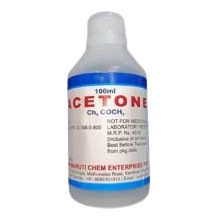Get A Quote
BIS Certification for Acetone IS 170: 2004

Acetone is a highly versatile and volatile solvent with applications across multiple industries. In pharmaceuticals, it serves as an intermediate in drug synthesis, while in paints and coatings, it functions as a thinner and cleaner. It is also widely used in adhesives for dissolving and mixing components, and in the production of plastics and polymers, including polycarbonates and other synthetic materials. Adhering to IS 170:2004 standards ensures that acetone is of high purity, stable, and safe for its intended uses.
Introduction
Under the Quality Control Order 2023, the DPIIT has mandated BIS certification for Acetone in compliance with IS 170:2004. Effective from January 1, 2024, manufacturers must obtain BIS certification to market Acetone in India. This initiative promotes quality assurance and the safe usage of Acetone across industries, ensuring consistency and reliability.
Why BIS Certification is Necessary for Acetone
BIS certification ensures that Acetone adheres to the quality, safety, and purity standards outlined in IS 170:2004. Non-compliance with the Quality Control Order, 2023 is subject to penalties under the Bureau of Indian Standards Act, 2016. Certification instills confidence among industries using Acetone, guaranteeing its effectiveness and safety in critical applications.
BIS QCO for Acetone
Overview of Indian Standard IS 170:2004
IS 170:2004 outlines the quality parameters for Acetone, specifying minimum purity levels and the absence of harmful impurities to ensure its safety and effectiveness. The standard also defines key physical properties such as volatility, solubility, and stability, ensuring that Acetone performs reliably in various applications. Additionally, guidelines for packaging and labelling are provided to ensure safe handling and storage. These standards collectively ensure that Acetone is suitable for use in industrial and commercial applications, meeting both safety and performance requirements.
Process for BIS Certification for Acetone
The BIS certification process for Acetone includes:
- Application Submission: Submit the application form and necessary documents to BIS.
- Documentation Review: BIS verifies submitted documents for compliance with IS 170:2004.
- Factory Inspection: BIS officials inspect manufacturing facilities to assess quality control measures and production processes.
- Sample Testing: Samples are tested in BIS-approved laboratories to confirm adherence to Indian standards.
- Certification Grant: After successful inspection and testing, BIS grants certification, authorizing the use of the ISI mark on Acetone products.
Documents Required for BIS Certification for Acetone
Manufacturers must provide the following documents
to obtain BIS certification:
- Completed application form
- Details of the manufacturing process
- Quality control procedures and plans
- Test reports from BIS-approved laboratories
- Factory layout and equipment details
- Business registration documents
- Product specifications and technical data
- Declaration of conformity to IS 170:2004
Additional documents may be requested for specific regulatory or environmental compliance.
BIS ISI Mark Certification Costing And Timeline
To Know The Process in Detail, Please Visit:
- BIS ISI Mark Certification for Domestic Manufactures
- BIS ISI Mark Certification for Foreign Manufactures
Under BIS Registration Products ISI and CRS
Conclusion
BIS certification for Acetone under IS 170:2004 is
vital for maintaining quality, safety, and compliance in its industrial
applications. This regulation supports India’s objective to standardize
chemical production and ensure safety in critical sectors like pharmaceuticals
and manufacturing.
For manufacturers, navigating the BIS certification
process can be complex. EVTL India offers professional assistance to streamline
the certification journey, including document preparation, compliance
management, and regulatory submissions. With EVTL India’s guidance,
manufacturers can achieve seamless BIS certification for Acetone and other
chemical products, ensuring market readiness and compliance.
Contact EVTL
India today for expert
advice and support in obtaining BIS certification for Acetone and other
industrial chemicals!
Free Call Back
Latest News & Update
📅 BIS Critical Component List (CCL) Updates for Solar PV Modules
🕒 BIS Fee Concessions for MSMEs and Startups | EVTL India
📅 Guidelines for Implementation of Essential Requirements for Security of CCTV
🕒 Omnibus Technical Regulation (OTR) Amendment Order, 2025
🕒 Extension of Timeline for Filing Annual Returns by Battery Producers
📅 Extension of Timeline for Filing Quarterly and Annual Returns for E-Waste
🕒 Extension of Concurrent Running Period for IS 302-1: 2008 and IS 302 (Part 1): 2024
🕒 BIS Guidelines for Grant of Licence (GoL) | EVTL India
📅 CPCB Guidance on filing of Application, Fees and more
🕒 CPCB Notification on Labelling of Plastic Packaging
📅 Mandatory Compliance for Input Materials of Steel and Steel Products for Imports
🕒 BIS Guidelines for Scheme-X Certification for OTR-Regulated Products
📅 BIS Upgrades Product Certification License Numbers to 10-Digit Series
🕒 BIS Certification No Longer Mandatory for 14 Chemical & Polymer Categories
Why Choose EVTL INDIA
Expertise in Indian Regulatory Standards
End-to-End Support
Trusted by Top Indian & Global Brands
Fast Processing & Transparent Pricing
Strong Liaison with Indian Authorities
Company Profile














